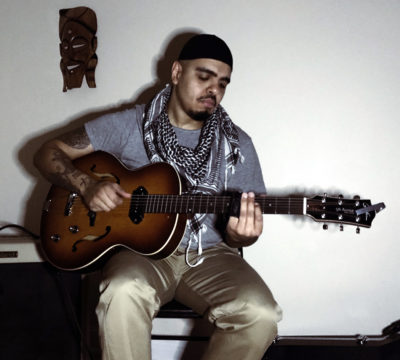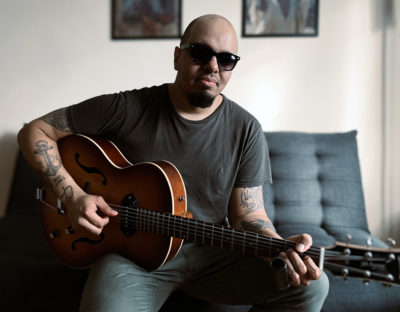 Up in Montreal, Quebec, Canada, there is an interesting guy you might not have heard of, a Moroccan-Canadian playing old time country blues. Essentially, he is either a walking testament to the universality of music or he represents the continuation of the blues across cultures, a North African playing the blues that are rooted in North and West Africa. He is Othman Wahabi, a proud Sunni Muslim, and he can play!
Up in Montreal, Quebec, Canada, there is an interesting guy you might not have heard of, a Moroccan-Canadian playing old time country blues. Essentially, he is either a walking testament to the universality of music or he represents the continuation of the blues across cultures, a North African playing the blues that are rooted in North and West Africa. He is Othman Wahabi, a proud Sunni Muslim, and he can play!
Islam has a rich musical tradition, as well as science, astronomy and mathematics. Contrary to some of the current perverted misinterpretations of Islam, when radical extremists forcibly forbid music, the first musical conservatory of mankind was in Moorish Spain. One of the richest musical tradition and philosophies comes out of Sufi Islam. The great Sufi philosopher Hazrat Inyat Khan teaches that music is essential to humanity– the mystery of sound is mysticism and that music contains the foundation of all knowledge within itself. The oud, for example, is still one of the most popular musical instruments all over North Africa. It is the precedent of the lute, which was the precursors of the guitar. Mali and Senegal are still among the most vibrant musical cultures in the world. Indeed, there is tremendously beautiful music in Islamic culture and all over sub-Saharan Africa. In recent years there has been a great deal of interest for Western musicians, and blues players, to reach back to Africa. Taj Mahal, Ry Cooder, Mighty Mo Rodgers, Eric Bibb, Corey Harris and others have made the trans-Atlantic journey to join African musicians into a cross-cultural amalgam that clarified the deep intrinsic connection between African American and African music. There was also great interest in Europe and America in African musicians, including Malians like Ali Farka Toure, Boubacar Traoré and Habib Koité, kora players like Toumani Diabate, but also for so-called “Desert Trance Blues” like Moroccan Gnawa impresario Hassan Hakmoun who plays the sintir, a three-stringed skin-covered bass plucked lute used by the Gnawa people. Moroccan Gnawa bands, like Nass Marrakech, have become world famous. Any serious paths of musical discovery will lead back to the roots, and the blues has direct, miraculouly unbroken links to Africa, a continent of tremendous artistic and creative achievement, too often overlooked.
Here we have a reverse journey, a North African playing African-American blues, with his finger tight on the pulse of its origins, not dissimilar to his own heritage as his ancestors were slaves brought to Morocco and that’s not the only connection that links him directly to the blues.
thecountryblues stumbled upon him by pure chance when surfing YouTube. He stuck out because he has the right vibe, a confident attitude in his style and more than enough hutzpah to garner attention. thecountryblues features not just the famous, but the up-and-coming, and we predict that this musician’s star is rising and we salute his commitment to the acoustic roots blues. On April 5, 2020 thecountryblues gave the bard a forum to tell his interesting story on the record. We reached him by phone in Montreal:
Othman Wahabi: “I grew up listening mostly to black music. I was born in Casablanca, Morocco, in 1983, September 26th, and my dad is a big music lover. I grew up with jazz records, Motown and of course all the blues records. When I was 11, I got my first guitar. I started playing, like most teenagers, metal and hard rock music. I was one of the founding members of the first rock metal bands in Morocco, and I did a lot of shows there, did some TV appearances. In 2005, when I was 21, I decided to move to Montreal, Canada, to study. I fell in love with the country and became Canadian. In 2011, I switched to blues because actually I did play blues in Morocco. I had a little band called Voodoo where we played covers of Jimi Hendrix and mostly blues rock, roots blues and all that. I then started playing alone with the guitar and harmonica, around Montreal. I discovered that a lot of people like my music saying, “Your blues is good.” Slowly I started getting deeper and deeper into the blues. I was starting to understand more why the blues were talking to me that much. I realized it’s not just because I grew up with the blues; it’s because it’s in my blood, like African DNA actually.
Hippies brought blues and rock Morocco in the ‘60s and ‘70s. Also, in Morocco we have folkloric music called Gnawa. It’s actually a West African style of music which was brought with the slaves in Morocco, because Morocco too had a sordid history of slavery. So being a descendant of Malian slaves, I was drawn to that style of Gnawa which is a mix of roots music, Griot, and it’s very like Sufi Muslim style. They sing about spirituality, god and of course the spirit of the forest and stuff like that. And that has a long connection with blues, because it’s the same rhythm you hear in the blues, and it’s also a rhythm you can hear when you listen to, for example, Malian music, like Ali Farka Touré.
Actually, when I started playing blues in Canada here, my blues was very like Muddy Waters and playing a lot about whiskey and women. Slowly, I started getting back to spirituality, and I found that the blues also was very spiritual. Many of the slaves that were brought to the Americas were Muslims, so the spirituality in the blues came out of Africa, and Islam plays a big role in that. I learned that about 40 percent of the slaves that were brought to the New World were actually Muslim, because they were from West Africa – Mali and Senegal and all that. Moroccan music is diverse, because Morocco has a lot of diversity. My family comes from the south of Morocco. Gnawa music is a music that has been brought by slaves to Morocco. That’s just reality. Why am I talking about Mali? Because most of these things were coming from Timbuktu, and the thing is you can hear it in the music. Slaves were brought mostly from Mali and Senegal, and they were brought to Morocco. That’s how they brought their music – for them it was a way to still keep their culture alive. Most of them were already Muslims, including Sufi, with Muslim poetry into their music. For me, I’m Moroccan but I feel that I’m African and I’m connected to brothers in Africa. So that’s how I feel.
The Muslim call to prayer in Africa, it’s not the same as the calling to prayer in Saudi Arabia. The tone of voice and how the muezzin – the person that calls to prayer does it is very similar to the early recordings for Alan Lomax and freedom songs. Of course, with time the American slaves forgot about the original culture, they had all been converted to Christianity. That’s how actually pretty much how the blues started. After that they didn’t call it the blues – some called it spirituals or Negro songs or they became like gospel. I feel like the real blues is spiritual and it is music about pain and suffering, and it’s also a way to connect us to our ancestors.
If you go to West Africa or you listen to Malian music, they sing about life, love stories and all that, but in a keen way.
Right now, things are difficult for musicians everywhere, of course. I was planning a French tour, maybe doing one or two gigs in Germany, France. I mostly play things that are more meaningful, like festivals. I’m trying to book a festival in Morocco. I plan to travel a lot. In Montreal, I play in a lot of jazz cafes. There’s a place I like a lot. It’s call Le Dépanneur Café. I like to play there because it’s very family friendly
I like Corey Harris, a big influence on my style and also the way I see the blues scene or the music world. I enjoy some songs by Keb’ Mo’. Also, one of the guys I love is John Hammond, Jr. Those are pretty much the acoustic blues people that I listen a lot to.
My music is authentic. When I say authentic, I’m talking about the way I see it. If people enjoy musicians like John Hammond, or like Corey Harris, my music fits in very well in the same style. I’m very eclectic in my writing, so in my music you can also hear some reggae, and other styles. I cherish staying open and creative. When I write songs, I tend to always keep the blues in it, but I want to allow people to feel the soul, to feel the jazz sometimes, to feel the reggae beat. Most of my repertoire is originals. I tend to do also some classic blues, Muddy Waters – one of my favorite artists to cover is John Lee Hooker.”

